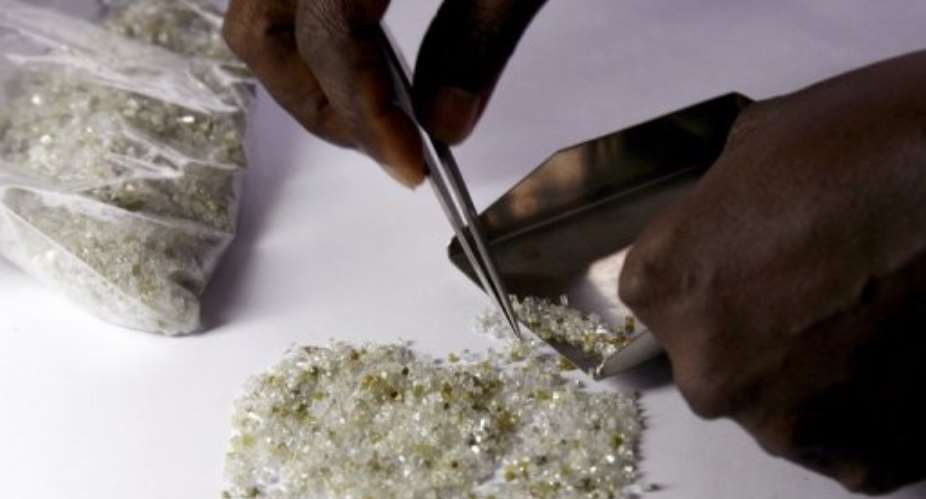JOHANNESBURG (AFP) - Foreign banks with investments in Zimbabwe are enabling human rights abuses by failing to stop local partners from facilitating illegal sales of the country's diamonds, rights groups said Tuesday.
The groups called on Barclays, Standard Bank and other banks with ties to Zimbabwe to audit their local partners for evidence of involvement in the sale of gems from the Marange diamond fields, which have been restricted since 2009 under the Kimberley Process, the international "blood diamond" watchdog.
The call comes as the groups, Human Rights Watch (HRW) and Partnership Africa Canada (PAC), released what they say is a leaked document from the parastatal Mineral Marketing Corporation (MMC) of Zimbabwe offering to sell more than $200 million (138 million euros) in illegal Marange diamonds through three Zimbabwean banks.
"This shows Zimbabwe was wilfully in breach of the ... ban on Marange diamonds," PAC research director Alan Martin told journalists.
He said foreign banks with ties to the three Zimbabwean banks are "exposing themselves to reputational harm."
Britain-based Barclays and South Africa-based Standard Bank both have multi-million dollar investments in the Commercial Bank of Zimbabwe, one of the banks suggested in the MMC memo as a vehicle to facilitate the illegal diamond sales, Martin said.
And the World Bank-affiliated International Finance Corporation (IFC) has extended an $89-million loan to BancABC, another of the Zimbabwean banks, he added.
"By facilitating these transactions, Barclays, Stanbic (Standard Bank) and the IFC are participating in diamond-related violence," he said.
"These banks subscribe to a higher ethical bar than those who are trafficking in these dirty diamonds."
Gems from Marange, touted as one of the richest diamond finds of the decade, have been tainted by evidence of gross human rights violations at the mines.
HRW says Zimbabwean soldiers gunned down more than 200 local miners in 2008, attacking them from helicopters and indiscriminately firing assault rifles as the military took control of the lucrative mines.
The BBC earlier this month aired a documentary alleging the army has set up a torture camp in Marange where local people are forced to mine the gems.
Rights groups say profits from the diamonds have gone to senior military officials and leaders of President Robert Mugabe's ZANU-PF party.
Despite the Kimberley Process restrictions, Harare has continued mining and stockpiling gems now estimated to be worth up to $5.0 billion -- nearly as much as the country's total annual economic output, which stood at $7.5 billion last year.
The rotating chair of the Kimberley Process, Mathieu Yamba of the Democratic Republic of Congo, in June ruled that Zimbabwe could resume exporting Marange diamonds mined by two different firms.
But the decision drew an outcry from Western countries and human rights groups, who said the move was invalid because the body's decisions must be reached by consensus.
The leaked memo released Tuesday is dated March 17, 2011 -- before Yamba's decision.
The handful of private firms operating in Marange have been keen to distance themselves from the reports of abuses.
But HRW senior researcher Tiseke Kasambala said Tuesday that private companies have also been guilty of "inhuman, degrading and barbaric" treatment of the local population.
She said security guards for the firms and the Zimbabwean police carry out joint patrols in which local miners have been shot in the back, beaten and attacked by dogs in a bid to chase them from the area.
© 2011 AFP





 Akufo-Addo commissions Phase II of Kaleo solar power plant
Akufo-Addo commissions Phase II of Kaleo solar power plant
 NDC panics over Bawumia’s visit to Pope Francis
NDC panics over Bawumia’s visit to Pope Francis
 EC blasts Mahama over “false” claims on recruitment of Returning Officers
EC blasts Mahama over “false” claims on recruitment of Returning Officers
 Lands Minister gives ultimatum to Future Global Resources to revamp Prestea/Bogo...
Lands Minister gives ultimatum to Future Global Resources to revamp Prestea/Bogo...
 Wa Naa appeals to Akufo-Addo to audit state lands in Wa
Wa Naa appeals to Akufo-Addo to audit state lands in Wa
 Prof Opoku-Agyemang misunderstood Bawumia’s ‘driver mate’ analogy – Miracles Abo...
Prof Opoku-Agyemang misunderstood Bawumia’s ‘driver mate’ analogy – Miracles Abo...
 EU confident Ghana will not sign Anti-LGBTQI Bill
EU confident Ghana will not sign Anti-LGBTQI Bill
 Suspend implementation of Planting for Food and Jobs for 2024 - Stakeholders
Suspend implementation of Planting for Food and Jobs for 2024 - Stakeholders
 Tema West Municipal Assembly gets Ghana's First Female Aircraft Marshaller as ne...
Tema West Municipal Assembly gets Ghana's First Female Aircraft Marshaller as ne...
 Dumsor is affecting us double, release timetable – Disability Federation to ECG
Dumsor is affecting us double, release timetable – Disability Federation to ECG
